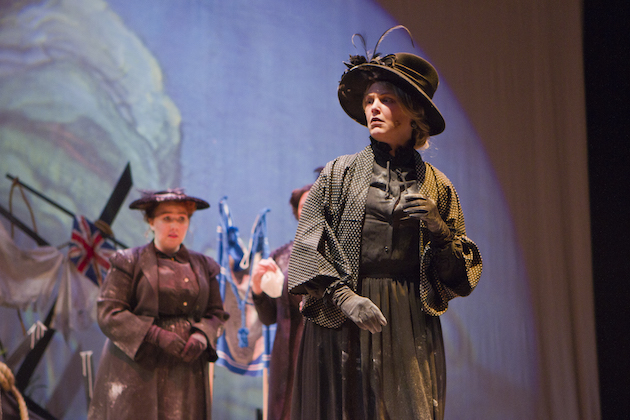
Slamming Door delivers a stylish production of Edward Bond’s eccentric script. (Photo of Cheyenne Mabberley and Genevieve Fleming by Erin Aberle-Palm)
Like a kid who has had the wrong kind of home schooling, Edward Bond’s The Sea is wildly creative—and undisciplined. It takes you to a refreshingly original imaginative world but then insists that you linger too long in some of the duller corners.
Set in 1907, The Sea unfolds in a seaside village in East Anglia—a village that the local draper believes is being invaded by space aliens. That’s why when Hatch, the draper, is summoned by floundering sailors on a stormy night, he refuses to help them and one of the men drowns. “They weren’t sailors,” Hatch later tells a group of locals to whom he preaches his conspiracy theories. “They weren’t even real storms.”
The Sea premiered in 1973, but its current relevance is clear. Like a lot of voters who have been captured by the new right, Hatch is exploited by the elite, his income is unstable, and his disenfranchisement activates paranoia about invasion. Also like many new-right voters, Hatch is intellectually isolated—in a literal village rather than an Internet silo—which makes it easier for him to deny reality.
Hatch’s escalating madness is one of the motors of the plot, but The Sea is essentially a comedy, a character-driven meditation on absurdity. And much of the absurdity has a decidedly Monty Python-esque spin.
That spin is inflected by class. Mrs. Rafi, the wealthy woman at the top of the local hierarchy, knows how to play the status game. “If I were a Catholic … I’d have been an abbess,” she confides. “I’d have terrified the nuns. They’d have loved it. Like living next door to the devil.” And, in her best zinger, she interrupts her browbeaten companion to say, “Stop trying to sound like a woman with an interesting past. Nothing has ever happened to you. That is a tragedy, but it hardly qualifies you to give advice.”
Other characters feel like they’ve walked straight out of the works of Anton Chekhov and Samuel Beckett to wander through this surreal landscape. Willy survived the shipwreck in which his best friend drowned and Rose was that friend’s betrothed. Surrounded by absurdity, both inhabit a melancholy naturalism.
And, like Waiting for Godot, The Sea includes a philosophical tramp—in this case, an old man named Evens who drinks too much, lives in a hut on the beach, and maintains a staunch optimism despite the odds.
Strong performances in director Tamara McCarthy’s production enliven this stylistic mix. Genevieve Fleming makes a nine-course meal out of Mrs. Rafi, declaiming in a basso profundo, cutting her eyes at her underlings, and going quiet for a poetic rumination on the meaninglessness of her existence. Stephen Aberle brings grounding intelligence and compassion to Evens, the tramp. Michelle Morris’s Rose is credibly emotionally bruised. And Raes Calvert is hilarious as both the ingratiating Vicar and a thick-headed townie named Carter.
Hatch, the draper, is a role of enormous range, so it’s no great knock to say that Elizabeth Kirkland doesn’t fill it out completely. Still, because Kirkland’s portrait isn’t as dynamic as it could be, Hatch’s descent gets repetitive—and it goes on for a long time.
While other actors are delivering genuinely eccentric performances, Melissa Oei falls into the trap of pulling faces as Mrs. Rafi’s companion, Mrs. Tilehouse.
Sandy Margaret’s set, with its handsome wooden pier and piles of marine detritus, is elegantly chaotic and the costumes, which were designed by Cheyenne Mabberley and Chantal Short, are witty—with seashells adorning the ladies’ hats, and bits of fishing net growing out of their trains.
The inconsistencies in Bond’s script are more significant than the inconsistencies in this mounting. Bond’s giddy premise and verbal wit are irresistible. But The Sea also includes long passages that feel narratively tangential and thematically slight. I’m thinking of the extended rehearsal of a play about Orpheus and Eurydice for instance, and the goofy slapstick at a funeral. There’s a philosophical exchange between Willy and Evens that’s awfully deliberate as written. And the play ends twice—in essentially the same manner.
The Sea offers a trip to a unique world. You don’t get to take those every day. But I still found myself thinking of home.
THE SEA By Edward Bond. Directed by Tamara McCarthy. Produced by The Slamming Door Arts Collective. At the Jericho Arts Centre on Thursday, May 2. Continues until May 19. Tickets.
NEVER MISS A REVIEW: To get links to my reviews plus the best of international theatre coverage, sign upfor FRESH SHEET, my free weekly e-newsletter.
And, if you want to keep independent criticism alive in Vancouver, check out my Patreon page. Newspapers are dying and arts journalism is often the first thing they cut. Fight back!





0 Comments